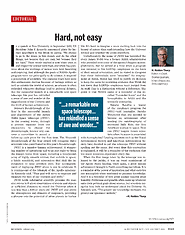This editorial refers to The Lavender Scare, a history book that was written by my fellow Gay Georgetown University alumni Dr. David Johnson, University of South Florida History Professor, and was made into a documentary. Dr. Johnson was one of our board members I the Georgetown Gay and Lesbian Alumni Association, when we helped convince our alma mater not to appeal the Court of Appeals ruling in the landmark case of Gay Rights Coalition v. Georgetown University, overruling the animus-ridden advice of Edward Bennett Williams, an anti-Gay chauvinist, for whom some of our Georgetown University Law Center buildings are still named.
Editorial from SCIENCE Magazine, published by the American Association for the Advancement of Science:
Hard, not easyIN SECTION EDITORIAL
In a speech at Rice University in September 1962, US President John F. Kennedy announced plans for human spaceflight to the Moon by saying, “We choose to go to the Moon in this decade and do the other things, not because they are easy, but because they are hard.” These words marked a time when trust in and respect for science were high, and when big questions about the workings of nature were both humbling and inspiring. And although the goals of NASA’s Apollo program were not principally to do science, it inspired a generation of scientists. The ensuing years have seen this enthusiasm decline because of failings within as well as outside the world of science, as science is often ridiculed whenever findings lead to political debates. But the successful launch of a remarkable new space telescope this year has rekindled a sense of awe and wonder at the magnificence of the Universe and the thrill of human achievement.
Science’s Breakthrough of the Year is the successful launch and deployment of the James Webb Space Telescope (JWST). In the coming weeks, through a process separate from the discussions to choose the Breakthrough, Science will convene a committee to award a follow-up cash prize for the first time. The Bhaumik Breakthrough of the Year award will recognize three scientists who contributed to this year’s Breakthrough.
JWST is a massive human achievement. A staggering number of operations had to go just right to bring the images home from space, including a honeycomb array of highly smooth mirrors that unfolds in space, a fabric sunshield, and cryocoolers that chill the instruments to near absolute zero. The accomplishment of deploying JWST alone is one to celebrate. It is reminiscent of the triumph of the Apollo missions: As Kennedy said, “That goal will serve to organize and measure the best of our energies and skills.”
JWST holds substantial scientific promise. Its massive mirror will allow observations of events and objects at sufficient distances to reveal the Universe when it was less than a billion years old. JWST will also probe the atmospheres and climates of exoplanets, providing a glimpse into the potential of other planets to harbor life. It’s hard to imagine a more exciting look into the beauty of nature than understanding how the Universe formed and whether life exists elsewhere.
Unfortunately, the name of JWST has tarnished the story. James Webb was a former NASA administrator who presided over some of the agency’s biggest accomplishments. But he served at a time when a program was initiated to fire LGBTQ+ employees on the basis of their sexual orientation, and he stated to Congress that these individuals were “unsuited” for employment at NASA. NASA has tried to justify its decision to keep the name by providing evidence that Webb did not know that LGBTQ+ employees were purged from its staff. This is a distinction without a difference. The point is that Webb’s name is a reminder of the socalled “Lavender Scare” and the homophobia in NASA and the scientific enterprise.
Natalie Batalha—a leader of the exoplanet program for JWST—told journalist Natalie Wolchover that she decided to become an astronomer after reading the autobiography of astronaut Sally Ride, the first American woman in space. How can JWST inspire future scientists when its name is associated with homophobia? Leading societies such as the Royal Astronomical Society and American Astronomical Society have decided to call the telescope JWST without spelling out the name. But every time this convention is explained, it will be a reminder of the exclusion that too many scientists experience every day.
When the first image taken by the telescope was released to the public, it was an event reminiscent of the Apollo Moon landing. Once again, a great human achievement brought to Earth something marvelous. It is a reminder of the power of inspiration and what societies can accomplish when motivated to generate knowledge. And it is a reminder of how great science requires great humility. Politicians and pundits often make up whatever suits their political goals about science, but scientists recognize how little we understand about the Universe. As Kennedy said, “The greater our knowledge increases, the greater our ignorance unfolds.”
–H. Holden Thorp

No comments:
Post a Comment